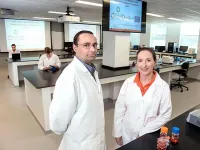(Press-News.org) Tuberculosis (TB) is a deadly infection that occurs in every part of the world. The standard treatment for TB, a six-month multidrug regimen, has not changed in more than 40 years. Patients can find it difficult to complete the lengthy regimen, making it more likely that treatment resistance will develop.
A research team led by a Medical University of South Carolina (MUSC) investigator reports in the May 6 issue of the New England Journal of Medicine that a four-month treatment regimen using rifapentine is effective for treating TB. Shortening the treatment duration is an important step toward increased patient adherence.
In 2019 alone, 1.4 million people died from TB worldwide. TB is caused by a bacterial infection that attacks the lungs of those infected. The World Health Organization estimates that one-quarter of the world's population has a TB infection, and those individuals will have a 5% to 10% lifetime risk of developing full TB disease. Individuals with compromised immune systems, such as people with HIV, have a much higher risk of developing TB.
"TB often affects adults in the prime of their lives," said Susan Dorman, M.D., a professor in the College of Medicine at MUSC and first author of the study. "This disease and treatment can disrupt lives and pull families into poverty."
While TB is curable and preventable, multidrug-resistant TB remains a top public health threat.
Resistance occurs when bacteria develop the ability to defeat drugs that are designed to kill them. When one bacterium in the colony figures out how to defeat a particular drug, it can quickly communicate out those instructions to neighboring bacteria, similar to sending out a group text message.
The current treatment for those with an active TB infection is a multidrug regimen over the course of six to nine months. Because different antibiotics use different mechanisms to defeat bacteria, TB is treated with several antibiotics at once to decrease the chances that the bacteria will become resistant to the drugs.
"Patient adherence to the taxing drug regimen has been a huge problem worldwide, and it is the main factor that has given rise to the very drug-resistant forms of TB that are much more toxic, expensive and time-consuming to treat," said Dorman.
Reducing the length of time needed to treat tuberculosis has long been an important public health goal. The more patients who complete their treatments for TB, the less likely it is for bacteria to escape with knowledge to defeat a particular drug and continue the group message thread to other bacteria.
"Shortening the treatment time improves adherence, decreases costs to programs and decreases the burdens on patients themselves," explained Dorman.
Dorman and her team at MUSC worked with both a Centers for Disease Control and Prevention (CDC) and a National Institutes of Health trials group to find a way to shorten the overall duration of treatment needed to cure the disease completely.
The team focused on a drug called rifapentine. This drug is similar to the antibiotic used in the current TB treatment protocol but remains effective in the body for longer periods of time. Over the course of 15 years, Dorman and her team performed preclinical and early phase clinical studies to determine how best to use this drug. They determined what dosage to give, how often the drug can be administered and what other antibiotics to pair with it. They then launched a worldwide phase III study with the TB Trials Consortium and the AIDS clinical trial group.
Patients with active TB infections were treated with one of two four-month rifapentine-based regimens or the standard six-month regimen. They were followed for 12 months. The results of the trial revealed that the four-month regimen containing rifapentine and another antibiotic, moxifloxacin, worked just as well as the six-month regimen. It was also safe and well-tolerated by the patients.
Dorman and her team hope these results will change how TB is currently being treated. In the U.S., their trial results will be submitted to the Food and Drug Administration (FDA). After the FDA reviews the data, the CDC will get involved and issue guidance on changing the treatment regimen. This process could take another 12 months to complete. In the meantime, Dorman and her team have been meeting with WHO representatives to develop guidelines for the new treatment.
"We're hopeful that the WHO will adopt this regimen and recommend it worldwide," said Dorman.
The results of this large phase III trial emphasize the importance of global participation and collaboration.
"Our intent was to enroll participants who reflected the overall world population of people with TB so that our results would be generalizable," said Dorman.
They also made sure to include those under the age of 18, along with people who have HIV. People living with HIV are 18 times more likely to develop active TB compared with people without HIV. The combination of HIV and TB is particularly lethal because the HIV virus attacks the main immune cells that help to coordinate a defense against the tuberculosis bacteria. Importantly, patients with HIV cleared their TB just as well as those without HIV in this phase III study.
"This work really represents a landmark in tuberculosis care, and some of the scientific work embedded in this trial will help us and others to understand how to improve TB treatment even more," said Dorman. "Four months is still too long."
INFORMATION:
About the Medical University of South Carolina
Founded in 1824 in Charleston, the Medical University of South Carolina (MUSC) is home to the oldest medical school in the South as well as the state's only integrated academic health sciences center, with a unique charge to serve the state through education, research and patient care. Each year, MUSC educates and trains more than 3,000 students and nearly 800 residents in six colleges: Dental Medicine, Graduate Studies, Health Professions, Medicine, Nursing and Pharmacy. MUSC brought in more than $271 million in biomedical research funds in fiscal year 2020, continuing to lead the state in obtaining National Institutes of Health funding, with more than $129.9 million. For information on academic programs, visit END
As meat-eating continues to increase around the world, food scientists are focusing on ways to create healthier, better-tasting and more sustainable plant-based protein products that mimic meat, fish, milk, cheese and eggs.
It's no simple task, says renowned food scientist David Julian McClements, University of Massachusetts Amherst Distinguished Professor and lead author of a paper in the new Nature journal, Science of Food, that explores the topic.
"With Beyond Meat and Impossible Foods and other products coming on the market, there's a huge interest in plant-based foods for ...
Physicists in Israel have created a quantum interferometer on an atom chip. This device can be used to explore the fundamentals of quantum theory by studying the interference pattern between two beams of atoms. University of Groningen physicist, Anupam Mazumdar, describes how the device could be adapted to use mesoscopic particles instead of atoms. This modification would allow for expanded applications. A description of the device, and theoretical considerations concerning its application by Mazumdar, were published on 28 May in the journal Science Advances.
The device which scientists from the Ben-Gurion University of the Negev created is a so-called Stern Gerlach Interferometer, which was first proposed one hundred years ago by German physicists Otto Stern and Walter ...
Researchers in Lund, Copenhagen and Norwich have shown that harmful mutations present in the DNA play an important - yet neglected - role in the conservation and translocation programs of threatened species.
"Many species are threatened by extinction, both locally and globally. For example, we have lost about ten vertebrate species in Sweden in the last century. However, all these species occur elsewhere in Europe, which means that they could be reintroduced into Sweden. Our computer simulations show how we could theoretically maximize the success of such reestablishments", says Bengt Hansson, biologist at Lund University.
In a new study published in Science, the researchers investigated which individuals might be most suited for translocation ...
The COVID-19 pandemic forced instructors to adapt their courses for online learning. Laboratory courses were particularly difficult due to lack of access to specialized equipment for remote learners. To overcome this challenge, researchers from the University of Illinois Urbana-Champaign designed a laboratory exercise to teach students how to use micropipettes, through remote learning, using at-home kits.
Micropipettes are common--and essential--laboratory instruments and are used in several fields including molecular biology, microbiology, and biochemistry. They are used to accurately transfer very small volumes of liquid. To teach students how to use these instruments, the researchers developed kits, costing $135 per student, that were a fraction ...
COLUMBUS, Ohio - New research suggests that African American families living in public housing are a "hidden population" when it comes to national suicide prevention efforts.
The study showed 11% of Black teens and young adults living in a mid-Atlantic public housing development reported that in the previous 12 months, they had made a plan to die by suicide.
The finding fits with what previous research has shown: that African American youths are the fastest-growing group engaging in suicidal behavior and dying by suicide, and have the highest suicide death rate increase among any other racial or ethnic minority group, ...
How plants cope with stress factors has already been broadly researched. Yet what happens when a plant is confronted with two stressors simultaneously? A research team working with Simon Haberstroh and Prof. Dr. Christiane Werner of the Chair of Ecosystem Physiology at the Institute of Forest Sciences and Natural Resources (UNR) of the University of Freiburg is investigating this. Together with colleagues from the Forest Research Center of the School of Agriculture of the University of Lisbon in Portugal and the Institute of Meteorology and Climate Research at ...
Highlights
Among adults with kidney failure undergoing hemodialysis in New York City, Black and Hispanic patients were more likely to develop symptomatic COVID-19 than White patients.
Neighborhood-level social vulnerability factors were associated with COVID-19 incidence among White patients, but these factors did not explain racial/ethnic disparities.
Washington, DC (June 1, 2021) -- In an analysis of patients on hemodialysis in New York City, there were substantial racial/ethnic disparities in COVID-19 rates that were not explained by neighborhood social vulnerability. The findings appear in an upcoming ...
LOWELL, Mass. - A UMass Lowell geologist is among the researchers who have discovered a new type of manmade quasicrystal created by the first test blast of an atomic bomb.
The formation holds promise as a new material that could one day help repair bone, insulate heat or convert heat to electricity, among other uses, according to UMass Lowell Prof. G. Nelson Eby, a member of the university's Environmental, Earth and Atmospheric Sciences Department.
Eby is a member of the research team that identified the quasicrystal substance inside samples of trinitite they examined that were collected from the debris of the first atomic bomb detonated by the U.S. Army on July 16, 1945 in the New Mexico desert. Also known as atomic rock, trinitite ...
New York, NY, June 3, 2021 -- A study of over 59,000 Icelandic adolescents by a team of Icelandic and North American behavioral and social scientists found that COVID-19 has had a significant, detrimental impact on adolescent mental health, especially in girls. The study is the first to investigate and document age- and gender-specific changes in adolescent mental health problems and substance use during the COVID-19 pandemic, while accounting for upward trends that were appearing before the pandemic. The findings are published in The Lancet Psychiatry.
The study found that negative mental health outcomes were disproportionately reported by girls and older adolescents (13-18-year-olds), compared to same-age peers prior to the pandemic. At the same ...
A first encounter with the dengue virus typically causes very mild symptoms; however, a subsequent infection is a different story. For a small proportion of people who are reinfected, the virus can cause severe symptomatic disease, which is often life-threatening.
"The main hypothesis for some time has been that antibodies generated the first time around, instead of providing protection against disease, can actually exacerbate it," says Stylianos Bournazos, research assistant professor at Rockefeller. "But even in secondary infection, we see a wide range of symptoms--so ...



